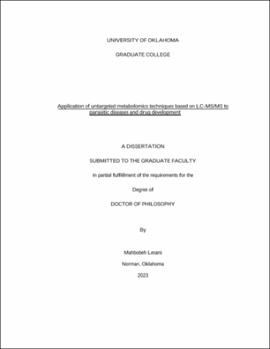| dc.contributor.advisor | McCall, Laura-Isabel | |
| dc.contributor.author | Lesani, Mahbobeh | |
| dc.date.accessioned | 2023-08-11T18:30:53Z | |
| dc.date.available | 2023-08-11T18:30:53Z | |
| dc.date.issued | 2023-08-04 | |
| dc.identifier.uri | https://hdl.handle.net/11244/338853 | |
| dc.description.abstract | Metabolites are small chemical molecules less than 1500 Da such as carbohydrates, lipids, and amino acids that provide different functions in organisms. These metabolites are the products of host metabolism or received from the environment. Exploring metabolite perturbation provides valuable insights into metabolic functions and responses to internal and external factors, including diseases. This dissertation applied untargeted metabolomics based on mass spectrometry to investigate metabolic perturbation induced by infection in two parasitic diseases, leishmaniasis and toxoplasmosis. We applied LC-MS/MS, a powerful analytical technique with high resolution and well-suited for complex biological samples. In these studies, we focused on individual organs and investigated how the metabolome changed and which metabolic pathways were affected by infection. Our results will increase knowledge about disease mechanisms, which can lead us to identify biomarkers and new treatments. In addition, we evaluated the effects of different doses of carnitine, alone or in combination with benznidazole, on chronic stage of Chagas disease in mouse models. Carnitine was identified through an untargeted metabolomics study related to Chagas disease caused by Trypanosoma cruzi, and shown to improve heart health in chronic infection, without affecting parasite burden. Our goal was to assess the safety and efficacy of carnitine as a potential treatment option combined with the antiparasitic drug, benznidazole, for chronic stage. Our result showed no negative effect of carnitine on antiparasitic effect of benznidazole and no negative effect on mice health. Based on our results, it is important to determine the right dose of carnitine to prevent from increase of trimethylamine N-oxide (TMAO) level in plasma to prevent cardiovascular risk. This dissertation provided new insights into host-parasite interactions for leishmaniasis and toxoplasmosis, while evaluating safety and efficacy of Chagas disease. | en_US |
| dc.language | en | en_US |
| dc.rights | Attribution-NonCommercial-NoDerivatives 4.0 International | * |
| dc.rights.uri | https://creativecommons.org/licenses/by-nc-nd/4.0/ | * |
| dc.subject | Leishmaniasis | en_US |
| dc.subject | Untargeted metabolomics | en_US |
| dc.subject | Metabolomics | en_US |
| dc.subject | Toxoplasmosis | en_US |
| dc.subject | Chagas disease | en_US |
| dc.title | Application of untargeted metabolomics techniques based on LC-MS/MS to parasitic diseases and drug development | en_US |
| dc.contributor.committeeMember | Bartley, Laura | |
| dc.contributor.committeeMember | Schroeder, Susan | |
| dc.contributor.committeeMember | Deloen, Kara | |
| dc.contributor.committeeMember | Yang, Zhibo | |
| dc.contributor.committeeMember | Sankaranarayanan, Krithivasan | |
| dc.date.manuscript | 2023-07-14 | |
| dc.thesis.degree | Ph.D. | en_US |
| ou.group | Dodge Family College of Arts and Sciences::Department of Microbiology and Plant Biology | en_US |
| shareok.orcid | 0000-0002-1644-1615 | en_US |
| shareok.nativefileaccess | restricted | en_US |

